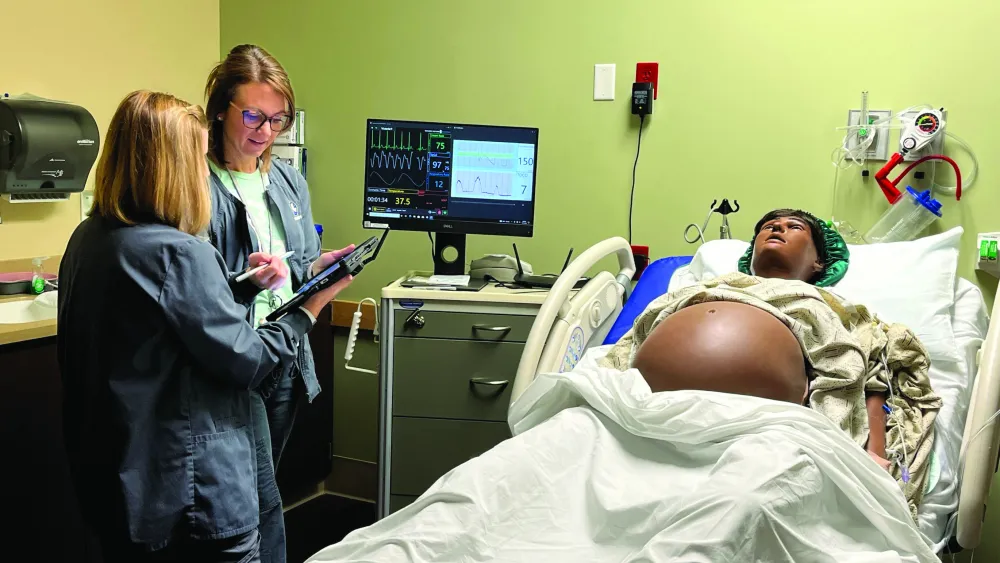The Meaning of Care Magazine
Methodist Hospital Foundation: Innovation and philanthropy drive educational outreach
Published: May 22, 2024

Victoria is having a baby – and she’s beyond mincing words.
“This is the worst pain ever,” she declared.
“It’s not going to be long,” reassured Mary Seger Barker, MSN, RNC-OB, C-EFM, CIMI, a clinical nurse educator at Methodist Women’s Hospital. “I can see the top of the baby’s head.”
Remarkable and resilient, Victoria had another baby the day before. She will likely deliver again in a day or two.
“Victoria is always in labor. She never gets to go home,” said Ashley Denker, MSN, RNC-MNN, IBCLC, another clinical nurse educator at Women’s Hospital.
That’s because Victoria is a life-size, robotic labor-and-delivery simulator. Gifts to Methodist Hospital Foundation funded the hands-on learning tool, which is part of a multifaceted educational outreach program based at Women’s Hospital.
“You can customize the simulator’s birthing scenarios to whatever you like,” Denker said. “Victoria can deliver Caesarean. She can deliver breach. She can have a seizure or a postpartum hemorrhage.”
Denker, Seger Barker and the other members of Methodist’s labor and delivery outreach team share best practices, training and resources with OB/GYN care teams in almost four dozen rural communities – for free. The goal is to ensure the healthiest pregnancies and deliveries possible while keeping OB/GYN patients close to home.
The need is greater than ever. Maternity care deserts are a growing concern in rural communities across the country. According to the March of Dimes, Nebraska currently ranks ninth-worst in the nation for the number of women living with limited or no access to maternity care. In Nebraska, that’s about 80,000 women.
Educational outreach is just one way Methodist is responding to the crisis. The work includes a calendar of fellowships and other programs hosted mainly at Women’s Hospital.
“We have nurses that travel here from their facilities, attend our classes and take that information back to their communities,” said Denker.
The nurse educators also travel to critical access facilities by request, allowing care teams to train in their units with their supplies. While they aren’t equipped to bring 130-pound Victoria on the road, they can travel with newborn Tory, another high-tech simulator funded by philanthropy.
“We’re excited to bring very lifelike simulation to these communities,” Denker said.
She hopes that with donor support, the team will be able to purchase a second Victoria and a van to haul the robot to sites around the region.
For now, the original Victoria is taking a moment to enjoy her newest addition – another baby girl.
“She’s beautiful,” Victoria gushed.
More Resources
- Read more from the spring/summer 2024 issue of The Meaning of Care Magazine.
- Learn more about Methodist Hospital Foundation.
- Learn more about women's health services at Methodist.

